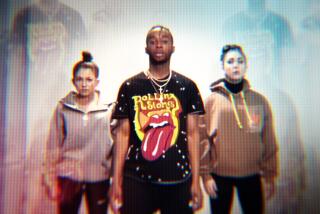Michael Jackson’s sexual abuse accusers speak out at ‘Leaving Neverland’ premiere
- Share via
Reporting from Park City, Utah — The new four-hour documentary “Leaving Neverland,” in which two men accuse late singer Michael Jackson of sexually abusing them as children, sent shock waves through the Sundance Film Festival at its premiere here Friday.
The claims made by Wade Robson and James Safechuck are a matter of public record, as both men were involved in multiple lawsuits brought against Jackson’s companies beginning in 2013. (The cases were later dismissed for being outside the statute of limitations.)
Robson accused Jackson of repeated sexual abuse when he was between the ages of 7 and 14. Safechuck alleges that he was sexually abused from the time he was 10 until he hit puberty.
“Leaving Neverland,” which unfolds in two two-hour parts, adds explicit new details to the accusations made by both men of sexual abuse that allegedly occurred at Jackson’s Santa Barbara County estate, dubbed Neverland Ranch, and across the globe. In addition to stories from both men of mutual masturbation, oral sex and, eventually, attempted anal sex with Jackson, Safechuck says in the film that Jackson had told him that he was the singer’s first sexual experience.
In a statement before the Sundance premiere, the Jackson estate declared, “This is yet another lurid production in an outrageous and pathetic attempt to exploit and cash in on Michael Jackson.”
After the premiere, the estate released another lengthy statement denying the allegations and casting doubt on the motivations and veracity of the accusers. “The film takes uncorroborated allegations that supposedly happened 20 years ago and treats them as fact,” one portion of the statement read.
“These claims were the basis of lawsuits filed by these two admitted liars which were ultimately dismissed by a judge. The two accusers testified under oath that these events never occurred. They have provided no independent evidence and absolutely no proof in support of their accusations, which means the entire film hinges solely on the word of two perjurers.”
Because both men initially testified on Jackson’s behalf when he was accused of sexual abuse in 1993 — saying that they never had any sexual experiences with the singer (Robson repeated that when he testified again in 2005 at Jackson’s trial in Santa Barbara County) — their credibility has already come under heavy scrutiny from Jackson’s fans. The documentary explains at some length not only why the men originally defended Jackson, but what made them go public with their accusations when they did.
In an emotional Q&A after the packed screening, “Leaving Neverland” director Dan Reed discussed the process of getting Robson and Safechuck to open up for extensive on-camera interviews. And Robson and Safechuck, who were also present for the screening, addressed their motivations for taking part in the project.
The docuseries originated from Reed’s discussions with the U.K.’s Channel 4. It will air on HBO in the spring. At the time that Robson and Safechuck made their court filings, Reed said he saw that “it might mean for the first time someone might be able to tell the story of what actually happened” between Jackson and young boys.
Michael Jackson accusers Wade Robson and James Safechuck: A brief history of their abuse claims »
Robson and Safechuck said they had been trying to communicate with each other for years, but during the legal process they were forbidden from discussing with each other the details of what had happened.
“What brought me into the court case was just wanting to talk to Wade, and ironically that was the one thing I couldn’t do,” Safechuck said after the screening.
“Being together now is beautiful,” Robson added.
In the years since they’ve gone public, Robson and Safechuck have faced accusations that they’re interested only in getting money from the Jackson estate. So the Sundance festival moderator asked whether they had received payment for appearing in the documentary.
“From the get-go, there was no money ever offered and we never expected anything,” Safechuck said. “It was really trying to tell the story and shine a light on it. To give people [who have survived abuse] the same connection and comfort we’ve got going through this.”
“We’ve been looking for a platform to be able to tell the truth,” Robson said. “This film was nothing we ever thought about or sought out. It came to us individually.”
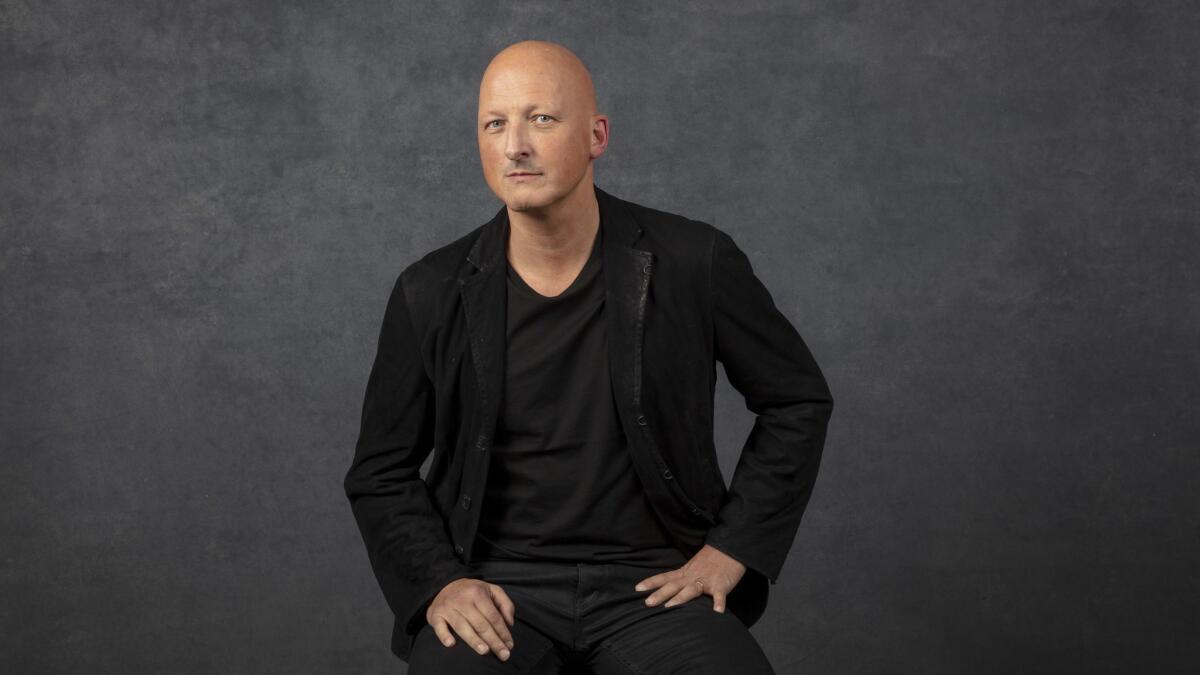
‘Leaving Neverland’ director talks Michael Jackson sexual abuse accusations and potential fallout »
Now, Robson and Safechuck hope that the film will will have a positive effect for sexual abuse survivors. “We can’t change what happened to us,” Robson said. “We can’t do anything about stopping Michael. He’s dead. That’s gone. What happened happened. The feeling is, ‘What can we do now?’ Hopefully it helps other survivors feel less isolated.... One of my greatest hopes is raising awareness for parents, teachers, business leaders to help prevent this from happening.”
“Leaving Neverland” tells the story not only of Robson and Safechuck but of their immediate families as well. Both of their mothers have come under criticism for allowing their sons to spend nights alone with Jackson in his bedroom in his Santa Barbara County estate. The full ramifications of those decisions are dealt with in the second half of the film.
“My mom saw it,” Safechuck said. “I think she was looking for forgiveness in the film, and I didn’t quite give it to her. It was hurtful for her. What she needs to understand is forgiveness isn’t a line you cross; it’s a road you take. And I’m on that road.”
“I was really scared for my mother to see it,” Robson said. “I saw it hours before her, for the first time. I was scared ... things I said, things I didn’t say, things my brother said that have never really been communicated in our family dynamic.
“It’s not the usual way doors open up for a family, in a film that’s going to go out all over the world ... but hopefully it can open doors for healing.”
When an audience member raised the question of what the men would say to Jackson’s most devoted fans, some of whom have very publicly criticized Robson and Safechuck for speaking out, Robson offered a compassionate reply.
“I don’t feel like there’s anything that I need to say to them except that I understand that it’s really hard for them to believe. Because in a way, not that long ago, I was in the same position that they were,” he said. “So I understand, and we can only accept and understand something when we’re ready. Maybe we’ll never be ready, maybe we will. So that’s their journey.”
FULL COVERAGE: 2019 Sundance Film Festival »
Sundance 2019 Film Festival: See the latest video interviews


Video: Behind the scenes of the L.A. Times 2019 Sundance photo/video studio
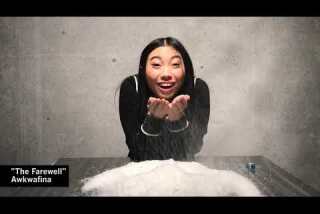
Video: The 2019 Sundance Film Festival Boomerang Supercut
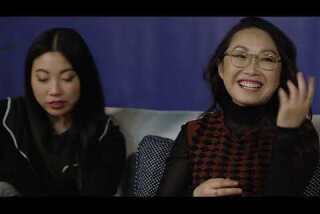
Video: How do you make the most of a small budget?
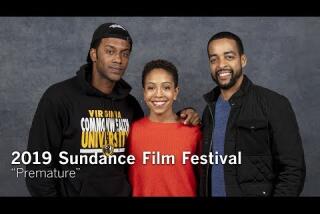
Video: Cast and filmmaker discuss trusting each other while shooting 'Premature'
3:12
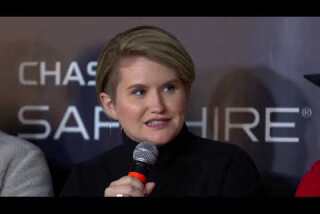
Video: 'Brittany Runs a Marathon' breaks conventions and stereotypes
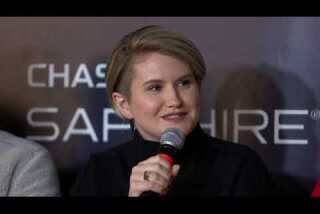
Video: Jillian Bell is tired of getting scripts about body image issues
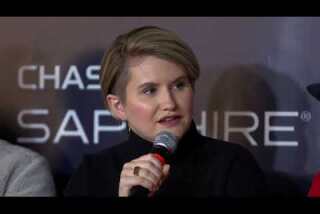
Video: Jillian Bell lost 40 pounds for her role in 'Brittany Runs a Marathon'

Video: 'Brittany Runs a Marathon' actors break out of their sidekick roles
More to Read
Only good movies
Get the Indie Focus newsletter, Mark Olsen's weekly guide to the world of cinema.
You may occasionally receive promotional content from the Los Angeles Times.


